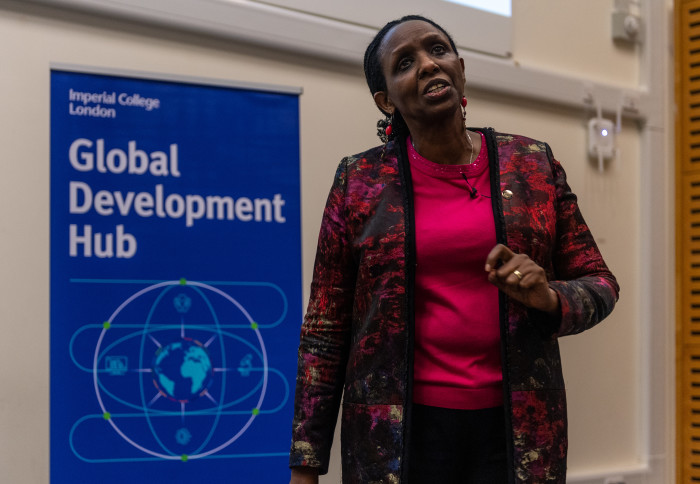World needs urgent action on climate to prevent food crisis, says Kalibata

The world needs to stop global temperatures rising by 1.5 degrees to prevent a global food crisis, says AGRA’s Dr Agnes Kalibata.
Speaking at the 2022 Annual Lecture of the Global Development Hub at Imperial College London, Dr Kalibata, the President of AGRA, called for urgent action to save farms across Africa.
"If we don’t stay within 1.5 degrees we really are in for trouble, all of us, not just Africa." Dr Agnes Kalibata President of AGRA
Dr Kalibata said: “We must stay within 1.5 degrees...for us in Africa there’s no place for us on the equator in a world that where temperatures rise by more than 1.5 degrees. Even now we are struggling.
“What happened last summer is something no one had foreseen.
“If we don’t stay within 1.5 degrees we really are in for trouble, all of us, not just Africa - which gets impacted first because it is very close to the equator.”
Professor David Nabarro, the co-lead, UN Global Crisis Response Group, World Health Organisation’s Special Envoy on COVID-19 and Co-Director of the Institute of Global Health Innovation at Imperial College London led a Q&A session with Dr Kalibata.
Professor Nabarro asked Dr Kalibata if there could be a situation where no agriculture is left in Africa by 2050 if things don’t change.
Dr Kalibata said: “That is what I’m trying to say...2050 was premised on the fact that we are still on track to stay below 1.5 degrees, if we are getting off track, how can 2050 still be.”
Transforming food systems
The special lecture was themed Transforming Food Systems: An Agenda for Science, Policymaking & Investment. During her talk, Dr Kalibata set-out a food systems change agenda for government, the private sector and policy makers, and underline the role for science and technology in driving innovation and informing evidence-based food systems interventions.
"We need to take care of our soils - it’s even more important in Africa because of the highly degraded soil." Dr Agnes Kalibata President of AGRA
Dr Kalibata highlighted the importance of farmers having access to latest technology, innovation and understanding of seeds, fertiliser and soils to improve yield in Africa.
Dr Kalibata said: “We need to take care of our soils - it’s even more important in Africa because of the highly degraded soil. It will be so important to feeding the world in ways that we won’t understand until the future.”
Dr Kalibata, who was a Special Envoy of the UN Secretary-General for the 2021 Food Systems Summit, said: “The food system is not broken, it still feeds us, but we have so many millions of people outside the system that are not getting enough food and millions of children still go undernourished.”

One of the current challenges in Africa is food distribution rather than production, Dr Kalibata explained. “The challenge in Africa is movement of food. We need to work out how to distribute food in Africa.”
Professor Nabarro, who helped to develop the SDG2 around ending hunger, said: "I am delighted that Dr Kalibata gave the inaugural lecture for the Global Development Hub.
"At Imperial we take great inspiration from her path-breaking leadership on food and nutrition – and, in particular, how this is always fully integrated within a systems approach connecting health, climate and resource scarcity, and poverty and inequality.
"Dr Kalibata is the embodiment of the interdisciplinary approach; combining vital intersections with policymakers, business and NGOs to see what works, review the evidence, and then push for bigger and bolder global interventions."
Since 2014, Dr Kalibata has been president of AGRA, an African-led organisation committed to improving the food security and incomes of farming households in African countries. Prior to that Dr Kalibata was Rwanda's Minister of Agriculture and Animal Resources, promoting the use of science-based approaches to agriculture to increase food production and improve food security, with a focus on family farmers.
After the lecture a science policy dialogue took place engaging organisations including Imperial, AGRA, World Food Programme, The Global Panel on Agriculture and Food Systems for Nutrition, FAIRR Initiative, ODI, Malabo Montpellier Panel, as well as African government representatives from London-based high commissions and embassies.
Global Development Hub

Imperial’s Global Development Hub brings together Imperial’s community to develop, amplify and support research and education impact in Lower Middle Income Countries (LMICs) and Least Developed Countries (LDCs). The Hub is led by co-chairs Professor Sarah Fidler and Professor Mike Templeton, who hosted and helped facilitate the special lecture.
The Hub supports Imperial's contribution to the United Nations Sustainable Agenda 2030, and our work more broadly with some of the most vulnerable and marginalised in societies where multiple global challenges are acutely concentrated.
Working alongside industry, an Imperial initiative has helped to boost crop yields sustainably and ensure access to safe, nutritious and sufficient food all year round (SDG 2).
NexGenAgriChem is an innovative, multidisciplinary Doctoral Training Programme, run by Imperial and world-leading agrochemical company, Syngenta, which is finding ways to increase plateauing yields whilst making crop production environmentally sustainable and resilient to changes in the climate.
Article text (excluding photos or graphics) © Imperial College London.
Photos and graphics subject to third party copyright used with permission or © Imperial College London.
Reporter
Stephen Johns
Communications Division